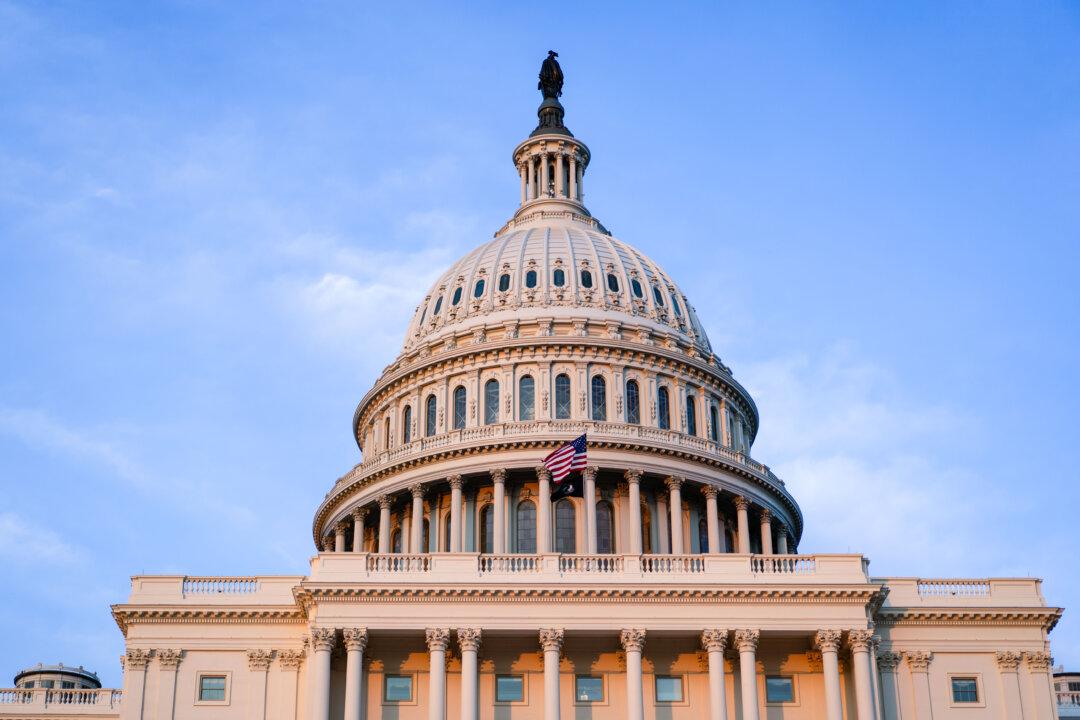Good morning, and welcome to The Epoch Times News Brief for Friday, July 12, 2024. I’m Bill Thomas, and we have a number of important stories to share with you as we prepare to head into the weekend.
A bill requiring proof of citizenship to vote passes in the House, more states are suing the federal government over a new health care rule, and thousands rally in Washington in protest of the Chinese communist regime. Also, membership fees are going up at a popular big box store, and a plague from the Middle Ages is back and we’ll tell you where it was found.
House Passes Bill to Require Proof of Citizenship for Voting in Federal Elections
Earlier this week, the House passed legislation that would require voters to provide proof of citizenship in order to vote in federal elections.The Safeguard American Voter Eligibility (SAVE) Act was introduced by Rep. Chip Roy (R-Texas), along with the support of House Speaker Mike Johnson and more than 100 other Republicans.
The SAVE Act would require people to display documents proving U.S. citizenship in voter registration applications for federal elections. Those documents could include a passport, a birth certificate, or a government-issued photo ID showing that the person was born in the United States. Individual states would not be allowed to process federal election applications without the required documents.
The SAVE Act would also require states to purge their voter rolls of any current noncitizens, in part by giving states no-cost access to databases run by the Department of Homeland Security and the Social Security Administration.
The bill was approved on a mostly party-line vote of 221–198, with five Democrats joining Republicans.
Democrats say they’re opposed to the bill because it would make it harder for natural-born and naturalized citizens to register to vote and because there are already laws on the books that prevent noncitizens from voting.
On the other hand, Republicans say the SAVE Act is needed to protect national elections because of concerns stemming from the National Voter Registration Act, also known as the Motor Voter law. That law allows people to register to vote at the same time that they pick up a driver’s license from a DMV office and does not allow states to ask for documentary proof of citizenship. The law only requires that DMV officials take a person’s word that they are in fact a legal U.S. citizen, unless that person’s eligibility is called into question.
So you know, the White House also opposes the SAVE Act, saying that individual states already have safeguards that verify voter eligibility and maintain the accuracy of voter rolls.
7 States Sue HHS for Forcing Health Providers to Perform Transgender Procedures
Missouri, Utah, North Dakota, South Dakota, Iowa, Idaho, and Arkansas, plus the American College of Pediatricians, have filed a lawsuit against the Department of Health and Human Services (HHS). The lawsuit challenges a new rule that requires health care providers to perform gender-transition procedures, including on minors, which the plaintiffs claim is an unconstitutional attempt to override state law.The rule aims to modify nondiscrimination protections in the Affordable Care Act in a way that expands the definition of sex discrimination to include discrimination based on “gender identity.”
It applies to all health programs and activities that receive federal funding, and requires that states pay for these gender-transition procedures through their Medicaid programs. It also forces health care providers who receive federal funding to perform those procedures, even if in violation of state law.
The complaint, filed just a few days ago in the U.S. District Court for the Eastern District of Missouri, argues that this new rule runs counter to the principles of federalism, and amounts to a freedom of speech violation.
The plaintiffs are asking the court to vacate the rule and declare it unlawful. You should know that this new rule was supposed to go into effect last week, but it’s been temporarily blocked by a Mississippi court in response to a similar lawsuit filed by 15 Republican states. This Missouri lawsuit is another attempt to block the controversial new rule.
Rally in Washington Calls for End to CCP’s 25-Year Persecution of Falun Gong
A number of human rights organizations, along with U.S. officials and thousands of Falun Gong practitioners, are calling on China to end its 25-year-long persecution of Falun Gong, a spiritual practice. They rallied in Washington yesterday at the National Mall, in condemnation of the communist regime’s human rights atrocities. This year marks a quarter of a century since the Chinese Communist Party (CCP) began its sweeping campaign against the group.You should know that Falun Gong, also known as Falun Dafa, is a spiritual practice that involves five meditative exercises and moral teachings based on the principles of truth, compassion, and forbearance. It was introduced to the public in China in the early 1990s.
The CCP, threatened by its popularity, started a mass campaign in 1999 to eliminate the group, by slandering the practice and detaining, torturing, and destroying the reputations of practitioners who refused to renounce their spiritual beliefs.
Commissioner Asif Mahmood, with the U.S. Commission on International Religious Freedom, says that “the U.S. condemns in the strongest possible terms the Chinese Communist Party’s brutal repression of Falun Gong practitioners“ and ”must remain vigilant as China’s persecution of Falun Gong extends far beyond its borders.”
Rep. Pat Ryan (D-N.Y.) also addressed yesterday’s crowds, saying in part that the United States stands for religious freedom, and “stands against the Chinese Communist Party’s direct attacks on that religious freedom.”
You should know that the U.S. House of Representatives passed a bill last month, co-sponsored by Mr. Ryan, calling for an “immediate end” to the persecution of Falun Gong.
The bill, described by the congressman as a “critical life and death legislation,” would also sanction those involved in the Chinese regime’s forced organ harvesting program.
Costco Raises Membership Fees for First Time Since 2017
Costco says it’s raising its basic membership fee from $60 to $65 a year.The company made that announcement a few days ago, when it released its June earnings report, adding that it’s the first time since 2017 that the company has bumped up the cost of membership.
Costco says that all U.S. and Canada Gold Star, Business, and Business add-on members will pay the increased annual fee beginning on Sept. 1 of this year. So you know, they’re also raising the annual fees for executive memberships this year from $120 to $130.
Historically, Costco has raised its membership fees every five years, but company executives wanted to ensure high renewal rates before making this latest move.
Interesting to note, the company currently operates 882 warehouses worldwide, including 609 in the United States and Puerto Rico, and the membership fee hike will affect around 52 million memberships.
Officials Confirm Case of Bubonic Plague in Colorado, Ask Public to Limit Its Spread
A case of the bubonic plague has been confirmed in Colorado’s Pueblo County, which is about an hour southeast of Colorado Springs.Earlier this week, the Pueblo County Department of Public Health said that a resident of the county contracted the disease. Officials say they'll continue “to investigate a potential source“ and ask the public ”to take the precautions” aimed at limiting the spread of the bacterial infection.
The U.S. Centers for Disease Control and Prevention (CDC) says that the plague occurs in wild rodents, and that it rarely spreads to people, but it can happen. When it comes to a person contracting the disease, the primary source is bites from fleas infected by the plague, but the bacteria can also be transmitted to humans simply by touching an infected animal or inhaling droplets from the cough of an infected person.
So you know, symptoms of the plague can include a sudden high fever and chills, headache, muscle aches, fatigue, and skin sores in rare cases, along with swollen lymph nodes and pain.
The plague can be treated successfully with antibiotics, and health officials advise anyone to seek immediate medical attention if they think they may be infected and that’s because early treatment is key in order to avoid more serious complications or even death.
You should know that an average of seven plague cases are reported in the United States each year, according to the CDC, with most of the cases happening in New Mexico and Arizona.
Now, a quick reminder—because we are in the throes of summer and the heat can really take a toll on you, please do all you can to keep cool and stay hydrated. The heat is more than just uncomfortable—it can lead to a variety of health-related issues including heat cramps, heat exhaustion, and even something called heatstroke.
Heatstroke is a condition caused by your body overheating, and it’s most common in the summer months, which we’re all hopefully enjoying right now.
You should know that our friends at the Mayo Clinic say that heatstroke requires emergency treatment and untreated heatstroke can quickly damage your brain, heart, kidneys, and muscles. The damage worsens the longer treatment is delayed, increasing your risk of serious complications or death.
Also, remember if you’re a pet owner, be sure to provide cool shelter for pets and plenty of water as well, and if you didn’t already know, cats and dogs can suffer from heatstroke as well.
Looks like our time is just about up for today, so we’re going to call it a wrap for the Friday edition of The Epoch Times News Brief.
If you have some free time today, we’d greatly appreciate it if you could tell some folks you know about our program, and thanks for helping us grow our always expanding News Brief Family!
Cheryl checks in from Etters, Pennsylvania—right next to the Susquehanna River. She says she loves the News Brief program—“Quick pace and informative!”
Barbara Nelson was also kind enough to send over a very thoughtful email.
And Nick Critelli checks in to say he enjoys the News Brief program because it both grabs and keeps his attention.
*(Don’t forget the News Brief Motto): We’re portable, affordable, and always on-demand.
And finally, as we do each and every day on this program, we wrap everything up with a very “notable” quote, and this one makes a lot of sense as we head into the weekend:
Fabulous author Catherine Pulsifer said: “When you leave work on Friday, leave work. Don’t let technology follow you throughout your weekend (answering text messages and emails). Take a break. You will be more refreshed to begin the workweek if you have had a break.”
We’ll take one of those breaks right now to tell you that The Epoch Times News Brief is written by Sharon Reardon, with production assistance from Clare, Faye, and a variety of additional producers, editors, and researchers all working behind the scenes to help keep you well informed.
For all of us here at The Epoch Times News Brief, I’m Bill Thomas.
Thank you for making us your one-stop source for a concise, accurate, and unbiased daily synopsis of many of the news stories you need to know about.
Enjoy the remainder of your day, and we’ll see you right back here tomorrow for the Saturday edition (the weekend edition) of the Epoch Times News Brief. Have a superb day today, and bye for now.







